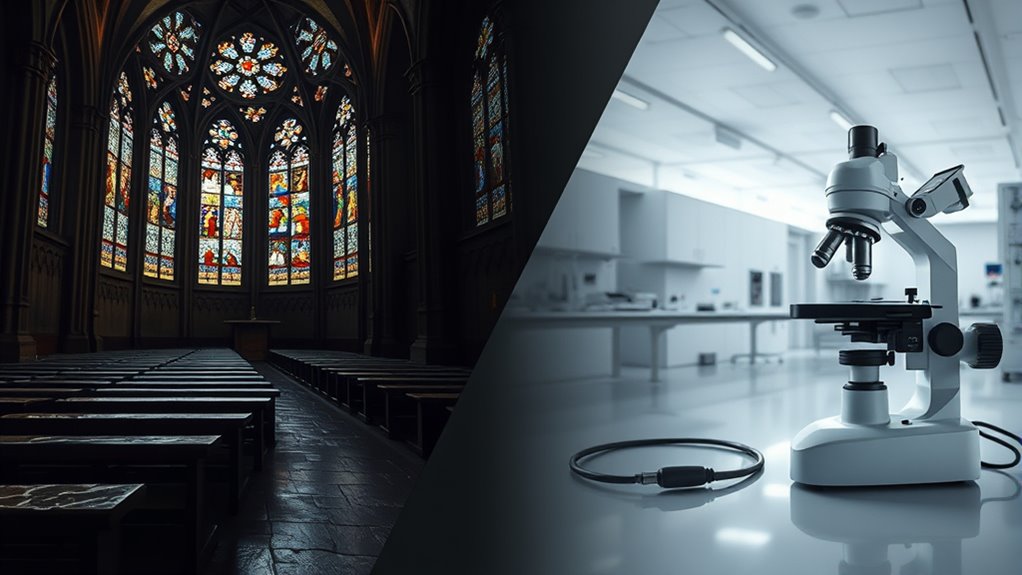Christianity and atheism offer contrasting worldviews that shape how you see the universe, morality, and life’s purpose. Christianity relies on faith in divine truths and sees the universe as intentionally created by God, guiding moral principles rooted in scripture. Atheism emphasizes scientific reasoning and natural causes, viewing the universe as purposeless but subject to human interpretation. Exploring these differences can deepen your understanding of how beliefs influence society and your personal worldview. Keep exploring to uncover more about this compelling contrast.
Key Takeaways
- Christianity relies on faith in divine revelation, while atheism emphasizes empirical evidence and scientific reasoning.
- Christian morality is based on divine commandments; atheism often derives ethics from personal or societal reasoning.
- Christianity views the universe as purposeful and created by God; atheism sees it as the result of natural processes.
- Human experience in Christianity connects to divine truth; in atheism, reasoning and evidence shape understanding of existence.
- Christianity influences culture through faith-based traditions; atheism promotes secularism, reason, and individual autonomy.
Origins and Foundations of Belief

Have you ever wondered how belief systems begin and what shapes their core principles? It often boils down to faith versus evidence. Christianity relies on faith, trusting in the divine even when empirical evidence isn’t visible. Believers accept divine truths based on spiritual conviction, not just natural explanations. In contrast, atheism tends to prioritize evidence, seeking natural causes for existence and phenomena. It questions the divine and emphasizes scientific reasoning, where claims require observable proof. These foundational differences influence how each worldview approaches origins—whether through divine creation or natural processes. Your choice depends on whether you lean toward trusting in spiritual revelation or relying on tangible evidence. Understanding these roots helps clarify why each system maintains its distinct perspective on reality.
Perspectives on Morality and Ethics

You might question where moral authority comes from and how it shapes your sense of right and wrong. Christianity often links ethics to divine commandments, while atheism tends to rely on personal or societal reasoning. This prompts the question: should morality be seen as objective, rooted in universal principles, or as relative, varying with individual or cultural perspectives?
Moral Foundations and Authority
At the heart of the debate over morality and ethics lies the question of authority: where do our moral values originate, and who or what has the right to define right and wrong? Christianity often cites divine commandments as the ultimate moral authority, believing that God’s rules establish objective standards of goodness. In contrast, atheism frequently leans toward moral relativism, asserting that moral values are human constructs shaped by culture and personal experience. This difference influences how you see morality’s foundation—either rooted in a divine source or subject to individual and societal interpretation. While divine commandments provide clear moral boundaries, moral relativism emphasizes flexibility, challenging the idea of absolute moral authority and prompting questions about moral consistency and universal ethics.
Source of Ethical Values
Where do our ethical values truly originate? In Christianity, many believe divine commandments from God provide the foundation for morality, offering clear standards of right and wrong. These commandments serve as a divine source of moral guidance, shaping believers’ actions and decisions. Conversely, atheists often rely on moral intuition—an innate sense of fairness, empathy, and justice—to determine what’s right. They argue that ethics develop naturally through human experience and social cooperation, without needing divine input. While Christians see divine commandments as objective truths handed down from a higher power, atheists view moral intuition as an evolutionarily developed trait that guides ethical behavior. Both perspectives seek a foundation for morality, but they differ fundamentally in the source they trust to define right and wrong.
Objective vs. Relative Morality
The debate over whether morality is objective or relative shapes how you understand right and wrong. If you believe morality is grounded in divine commandments, you see it as objective—unchanging and universal, dictated by a higher power. This perspective holds that moral truths exist independently of human opinions. Conversely, moral relativism suggests that ethics are flexible and depend on cultural, personal, or situational factors. If you lean toward moral relativism, you might think what’s right in one society isn’t necessarily right in another. As a Christian, you might trust divine commandments as the foundation of morality. An atheist, however, may see morality as subjective, based on human consensus or individual preferences, which can shift over time. This fundamental difference influences how each worldview approaches ethical decisions.
The Nature of the Universe and Existence

Understanding the nature of the universe and existence often reveals fundamental differences between Christianity and atheism. Christianity sees the universe as purposeful, created by a divine being with a cosmic purpose, where divine intervention plays a key role in history and life’s meaning. Atheism, however, views the universe as a result of natural processes, lacking inherent purpose or divine influence.
- Christianity asserts that existence has a divine origin, giving life meaning beyond physical matter.
- Atheism maintains that the universe exists without purpose, driven by chance and scientific laws.
- Belief in divine intervention supports a worldview where God actively shapes reality, contrasting with the atheistic view of a self-sufficient universe.
The Role of Human Experience and Reasoning

Human experience and reasoning serve as the guiding tools through which you interpret the universe and your place within it. For many, secular intuition provides an instinctive sense of what’s true without relying on religious doctrine, shaping their understanding of reality. Others trust spiritual insight, believing it offers a deeper connection to divine truth beyond logic alone. Reasoning helps you analyze evidence and form coherent beliefs, whether you lean toward skepticism or faith. You may find that personal experiences, combined with critical thinking, influence your worldview profoundly. Both Christianity and atheism rely on these faculties to justify their perspectives—whether through spiritual insight that affirms divine presence or secular intuition that dismisses it. Your approach to human experience and reasoning ultimately shapes how you interpret existence.
Impact on Culture and Society

How do beliefs in Christianity and atheism shape the cultures and societies they influence? Your worldview impacts societal norms, laws, and values. Christianity often promotes community, charity, and moral foundations rooted in faith, shaping cultural traditions. Atheism, with its secular influence, emphasizes reason, scientific progress, and individual autonomy. Both worldviews interact with religious pluralism, influencing how societies accommodate diverse beliefs.
Beliefs in Christianity and atheism shape societal norms, values, and cultural traditions through faith, reason, and pluralism.
- Christianity fosters religious institutions that influence education and charity work.
- Atheism encourages secular policies that prioritize scientific and rational approaches.
- Religious pluralism challenges societies to balance faith-based traditions with secular governance.
Your worldview guides cultural identity, social cohesion, and responses to moral issues, shaping society’s overall character.
Common Ground and Ongoing Dialogue

Despite their differences, Christianity and atheism can find common ground by focusing on shared values like compassion, justice, and community service. These core principles often drive both perspectives toward meaningful interfaith dialogue and cooperation. Recognizing common goals fosters mutual understanding and respect, paving the way for ongoing conversations. To highlight this, consider the following shared values:
| Value | Expression in Society |
|---|---|
| Compassion | Helping those in need |
| Justice | Promoting fairness |
| Community Service | Volunteering and support |
Frequently Asked Questions
How Do Atheists Find Meaning Without Belief in a Deity?
You might wonder how atheists find meaning without a deity. They often seek personal fulfillment through relationships, passions, and personal growth. Many believe that existential purpose comes from creating their own values and making a positive impact on others. By focusing on these aspects, you can find a sense of fulfillment and purpose in everyday life, knowing that your actions and choices shape your meaning without needing divine guidance.
Can Morality Exist Independently of Religious Teachings?
You might think morality depends solely on divine commandments, but secular morality shows otherwise. Morality can exist independently of religious teachings, rooted in empathy, fairness, and social well-being. While divine commandments provide guidance for many, you can develop a moral compass through reason and shared human values. This approach proves that morality isn’t exclusive to religion; it thrives on human connection and understanding, regardless of belief in a deity.
What Scientific Evidence Supports or Challenges Religious Claims?
You wonder what scientific evidence supports or challenges religious claims. Cosmology origins, like the Big Bang theory, suggest natural processes rather than divine intervention. Evolutionary evidence from fossils and genetics shows how species develop over time, challenging literal religious creation stories. While science provides explanations grounded in observable data, it doesn’t disprove spiritual beliefs but offers a natural understanding of the universe’s origins and development.
How Do Religious and Secular Communities Collaborate on Social Issues?
You see that religious and secular communities often work together on social issues through faith-based initiatives and secular partnerships. These collaborations leverage shared goals like poverty alleviation, education, and healthcare, fostering mutual respect and understanding. By combining resources and expertise, you help address complex problems more effectively, demonstrating that unity across different worldviews can create meaningful societal impact and promote community well-being.
What Are Common Misconceptions About Atheism and Christianity?
Think of misconceptions as fog that clouds understanding. Many believe myths about atheism and Christianity, like atheists lack morals or Christians are blind followers. These faith stereotypes aren’t true; they oversimplify complex beliefs. You might assume all atheists reject spirituality, or all Christians are conservative. Recognizing these myths helps you see beyond stereotypes, understanding that both worldviews are diverse and deeply personal, not monolithic ideas.
Conclusion
As you explore Christianity and atheism, remember that over 80% of the world’s population identifies with some faith, influencing countless cultures. Despite differences, both worldviews shape morality, ethics, and societal values. Embracing ongoing dialogue helps bridge gaps and fosters understanding. Whether rooted in faith or reason, your perspectives contribute to a richer, more diverse global conversation. Keep questioning, learning, and connecting — it’s through this exchange that meaningful progress happens.










